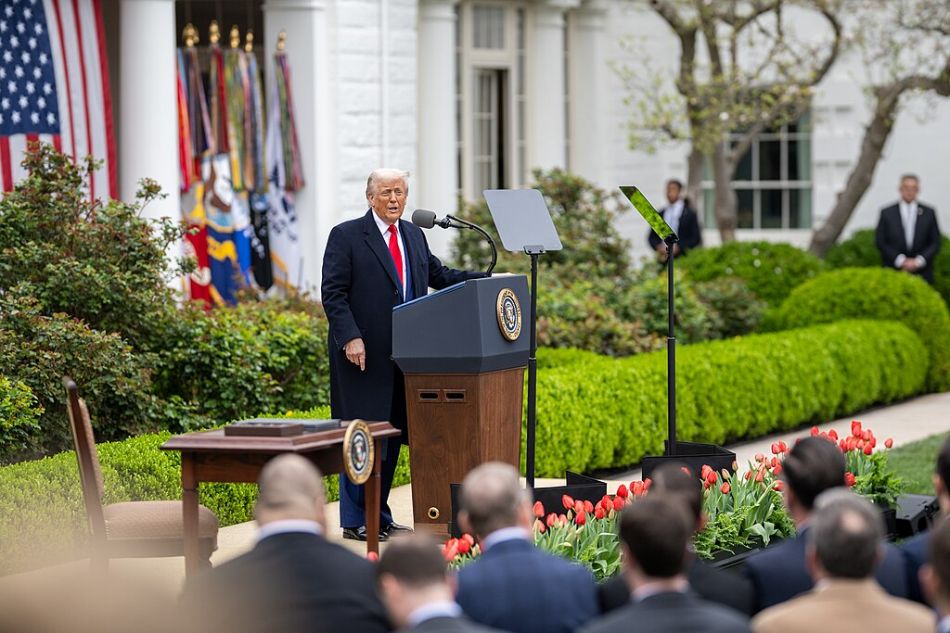Donald Trump’s recent tariff announcement and renewed push to end the war in Ukraine mark a sharp acceleration of a worldview he has never hidden. The real shock, however, is not the disruption itself—but Europe’s continued unpreparedness. Trump’s critiques of German surpluses, NATO contributions, and reliance on Russian gas long predate his current presidential bid. His rhetoric may be unconventional, but his logic has remained consistent—and is once again shaping U.S. foreign policy.
Despite a clear record of signals from Trump’s first term, much of Europe’s political class clung to the comforting belief that institutions, economic interdependence, and long-standing alliances would neutralize his strategic ambitions. His declarations were seen as bluster, not blueprints.
This miscalculation reflects more than flawed political foresight. It reveals a deeper dependency on the perceived stability of the post-Cold War international order and a reluctance to bear the political cost of timely preparation. Trump’s reemergence brings that vulnerability into sharp relief.
The 20% tariffs on EU goods, set for implementation in April, are not merely a shift in economic policy. They function simultaneously as instruments of geopolitical pressure. Trump does not view the European Union as a vital ally, but as a strategic beneficiary of the international system. In his framework, alliances are transactional, institutions are useful only when serving national interests, and trade is a tool of leverage—not mutual gain.
Europe’s initial response was marked by confusion. European Commission President Ursula von der Leyen warned of a “major blow to the global economy” and pledged a strong response to rising protectionism, while leaving the door open to negotiations. “Europe has what it takes to weather the storm,” she said. “If you strike one of us, you hit us all. That’s why we will stand by one another. Unity is our strength.”
Still, internal dynamics tell a different story. Varying tariff exposure, energy insecurity, and divergent political climates among member states point to fragmented reactions. The EU’s institutional design, built for consensus and procedural coordination, struggles to absorb strategic shocks—especially those that require speed and decisiveness.
This is no longer a simple policy dispute among allies. It is a test of the EU’s ability to operate as a strategic actor under pressure. The Trump doctrine—if one may call it that—is disruptive by intent. It aims to remake the international order around flexibility, economic nationalism, and unilateral leverage. This places structural strain on a union like the EU, whose legitimacy rests on institutional order, predictability, and collective governance.
Trump’s second chapter, however, unfolds in a very different global context. The war in Ukraine, an ongoing energy crisis, inflationary pressures, and the erosion of liberal democratic consensus in Europe have already exposed systemic limits. Now, with tariffs looming and strategic ambiguity deepening, the EU faces the challenge of acting as a coherent geopolitical entity.
Whether it can do so remains uncertain. Defense spending is rising, but unevenly. Initiatives like REPowerEU and REARM aim for greater autonomy but operate slowly. Energy diversification continues, yet dependency on Russian gas persists. The political center in Europe is fragile, with anti-establishment forces gaining momentum across multiple states.
Trump’s resurgence does not only reveal the volatility of American politics—it underscores the fragility of European assumptions. Strategic shocks become catastrophic only when systems fail or refuse to absorb them. If the EU wishes to remain a serious actor in an evolving international system, it must move beyond rhetorical unity and adopt a posture of realism, cohesion, and speed. That remains the only way to contain its internal centrifugal pressures and retain institutional relevance.
So far, that shift remains elusive. The EU’s structure does not lend itself to rapid, flexible strategic responses. The challenge posed by the new American posture is not merely external—it is systemic. Without timely adaptation, what’s at stake is not just Europe’s global role, but the coherence of the Union itself.
[Photo by the White House, Public domain, via Wikimedia Commons]
The views and opinions expressed in this article are those of the author.

The author is a political analyst and senior expert in anti-corruption policy, risk management, and public sector governance. She currently serves in a director-level position and has extensive experience in strategic planning and institutional reform. She is a member of the Hellenic Political Science Association.

